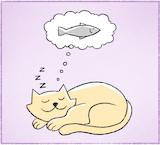


นี้คืออี่หยัง อันนี้เป็นแมว แมวโตหนึ่งนั้นหละ
มันกำลังนอนหลับซ้ำแมะ กำลังนอนหลับแซบๆ อยู่พุ้นหนะ นอนโตเดียวของมันข้อหล้อนั้นหละ
หลับตา งับปากพ้อมพุ้นแหล้ว นอนหลับ อุ้ย นอนหลับแซบคักแซบแน่เนาะ
กำลังฝันพ้อมพุ้นแหล้ว มันกำลังฝันฮอดปาโตหนึ่ง
มันกำลังฝันเห็นปาโตหนึ่ง
คือแบบว่ากำลังสิหิวเข้าพอดีนั้นหละ ว่ากำลังสิคิดพ้ออยากกินเข้า กะเลยฝันเห็นฮอดปาพอดี กำลังอยากได้กินปาพุ้นหละเนาะ
แล้วความฝันเนี้ย ขั้นเฮาฝันพ้อปา เฮาสิได้กินปาอี่หลีบ่ กะบ่ ความฝันมันเป็นสิ่งที่มันจินตะนาขึ้น จินตะนากานขึ้น หลือว่ามันเป็นแค่ความคิดที่มัน ที่เฮานอนหลับ แล้วเฮาคิดขึ้นเอง หลือว่าความคิดมัน เป็นสิ่งที่มันคิดขึ้นเอง เฮาบ่สามาดเห็นโตแท้ของจิงๆ ที่เฮา ของแท้ๆ ที่เฮาฝันฮอดหลือว่าฝันเห็นได้เนาะ
12
อันนี้คืออี่หยัง กะเป็นหมาเนาะ มีหมาโตหนึ่ง หมาโตสีเทาเนาะ กำลังนอนหลับอยู่
คือสินอนหลับแซบหลับนัวคัก เหลียวเบิ่ง ฝันเห็นฮอดกะดูกพ้อม กะดูกอันบักใหญ่พุ้นแหล้ว ฝันเห็นฮอดกะดูก
แล้วหมาโตนี้กำลังฝันเห็นกะดูก มันสิได้กินกะดูกแท้ๆ บ่ กะบ่เนาะ เพาะว่ามันเป็นแค่ความฝัน มันเป็นแค่เลี่ยงที่มันสมมุดขึ้น หลือว่าเลี่ยงที่มันจินตะนาขึ้น จินตะนากานขึ้น ในความฝันของเฮาซื่อๆ เนาะ
13
อันนี้คืออี่หยัง กะมีพุหญิงพุหนึ่งเนาะ กำลังนอนหลับอยู่
นอนหลับอยู่เทิงเตียงนอนพุ้นแหล้ว ห่มผ้าพ้อม หมุนหมอนพ้อม หมอนกะสีเหลียง ผ้าห่มกะสีฟ้า กำลังนอนอยู่เทิงเตียงนอนเนาะ
กำลังฝันพ้อมพุ้นแหล้ว คือสินอนหลับแซบคัก ฝันบ่ฮู้อีโหน้อีเหน้เนาะ ฝันฮอดโลงเลียน
อาดสิว่าเขากำลังอยากไปโลงเลียนพอดี กำลังสิได้ไปโลงเลียน แล้วกะฝันฮอดบางสิ่งบางอย่างนั้น
แต่ว่าความฝันหนิ บางสิ่งเนาะ ขั้นเฮาได้พ้อใน พ้อเลี่ยงใดเลี่ยงหนึ่ง หลือว่าพ้อเลี่ยงนั้นดุๆ หลือว่าคิดฮอดเลี่ยงนั้นดุๆ หลือว่าเว้าฮอดเลี่ยงที่เลี่ยงบางเลี่ยงดุๆ เฮาอาดสิเก็บมาฝันหลือว่าเก็บมาคิดกะได้เนาะ
Link to overview page
Link to dictionary
| Isaan | Pronunciation | Tones | Thai | English/Notes |
|---|---|---|---|---|
| นี้ | ni: | HF | นี้ | 1. this 2. here |
| คือ | khʉ: | HR | คือ | 1. to be, to resemble, like, as 2. why {บักหล้าคือบ่เก็บโต่ะแน่ = [addressing a young boy] Why haven't you cleared the table?} |
| อี่หยัง | i:-yaŋ | H-M | อะไร | 1. what {นี้คืออี่หยัง = What is this?} {มื้อนี้เจ้าเฮ็ดอี่หยัง = What are you doing today?} {กินเข้างายกับอี่หยัง = What did you have for breakfast?} 2. something, anything, (in negations) nothing {บ่ต้องเฮ็ดอี่หยังอีกเลยนอกจากใส่ปุย = [we] don't need to do anything besides adding fertilizer} |
| อัน | an | M | อัน | 1. thing, object 2. general clf. for objects |
| เป็น | pen | M | เป็น | 1. to be, to exist 2. to be able to 3. to suffer, sth. happens to 4. เป็นหญัง[...]คือ in initial position: why? {เป็นหญังเขากะคือแปงฟัน = Why is he brushing his teeth?} {เป็นหญังเคี่ยงบินมันคือสิตก = Why is the airplane falling down?} |
| แมว | mɛ:o | HR | แมว | cat |
| โต | to: | M | ตัว | 1. body, self 2. clf. for animals, characters/letters/consonants, appliances, clothes (e.g., pairs of trousers, shirts) |
| หนึ่ง | nʉŋ | H | หนึ่ง | 1. one 2. after adjective: intensifier {บักคักหนึ่ง = very much} {อันบักใหญ่หนึ่ง = very large}, or attenuates the meaning {กะดาดมันแผ่นน้อยๆ หนึ่ง = the piece of paper is [relatively] small} |
| นั้นหละ | nan-la | HF-M | นั่นแหละ | auxiliary for emphasis at the end of a phrase |
| มัน | man | HR | มัน | it (also used to refer to people) |
| กำลัง | gam-laŋ | M-HR | กำลัง | auxiliary indicating continuous or progressive action |
| นอนหลับ | nɔ:n-lap | HR-M | นอนหลับ | to sleep |
| ซ้ำแมะ | sam-mɛ | HF-H | (ด้วย)แหละ | final particle used for emphasis Notes: also pronounced ซ้ำแม |
| แซบ | sɛ:p | HF | อร่อย | 1. food: tasty {กวยเตียวมันแซบบ่ = Is the noodle soup tasty?} 2. sleep: well {เป็นตานอนแซบคัก = it looks as if she's sleeping very well} |
| อยู่ | yu: | H | อยู่ | 1. to be (located) at 2. yet, still 3. auxiliary indicating continuous or progressive action {ทอดปาอยู่ในกะทะ = (in the process of) frying a fish in the pan} {แม่กำลังเมี้ยนเฮียนอยู่ = mother is cleaning/tidying up the house} |
| พุ้นหนะ | phun-na | HF-H | นู่นแหละ | auxiliary for emphasis at the end of a phrase Notes: variant of พุ้นหละ |
| นอน | nɔ:n | HR | นอน | 1. to lie down 2. to sleep |
| เดียว | di:ao | M | เดียว | only, alone, single |
| ของ | khɔ:ŋ | M | ของ | of, belonging to |
| ข้อหล้อ | khɔ:-lɔ: | LF-LF | เท่านั้น, ขนาดนั้น, น้อยๆ | only {ต้นไม้มีต้นเดียว ต้นเดียวข้อหล้อ = there's one tree, only one tree} {มีบ้านหลังเดียวข้อหล้อ = there's only one house} |
| หลับ | lap | M | หลับ | 1. to sleep {นอนหลับ = to sleep (see separate entry)} 2. to close (the eyes) {หลับตา = to close one's eyes} |
| ตา | ta: | M | ตา | eye {เขามีตาสองข้าง = he's got two eyes} {หลับตา = to close one's eyes} |
| งับ | ŋap | H | งับ | to close, to shut |
| ปาก | pa:k | LF | ปาก | mouth |
| พ้อม | phɔ:m | HF | พร้อม | at the same time, also, too {มีตะเว็นพ้อม = the sun's out, too} {กะทะมีด้ามพ้อม = the pan has also a handle} |
| พุ้นแหล้ว | phun-lɛ:o | HF-LF | นู่นแหละ | auxiliary for emphasis at the end of a phrase Notes: variant of พุ้นหละ |
| อุ้ย | ui | HF | exclamation of surprise or when having made a mistake/correcting oneself | |
| คัก | khak | H | intensifier: very, very much | |
| แน่ | nɛ: | H | แน่, บ้าง | 1. some, somewhat 2. final particle, used to ask for examples (similar to Thai บ้าง at the end of a question) {หม้อใซ้เฮ็ดอี่หยังได้แน่ = What (different things) can a pot be used for?} {น้ำอัดลมซื้อได้อยู่ใสแน่ = Where/in which places can one buy soft drinks?} 3. final particle, when giving examples {มีเทิงส้งแน่ มีเสี้ยแน่ มีเกิบแน่ = there are trousers, shirts, shoes etc.} 4. final particle, used to give a command {ไปปิดหน้าต่างให้แน่ = Close the window!} 5. final particle, acting as an intensifier, especially in the pattern ... คัก ... แน่ {สูงคักสูงแน่ = very high} {ญ้องเฮาคัก ญ้องเฮาแน่ = [he's] praising me a lot} |
| เนาะ | nɔ | H | เนาะ | final particle: makes the statement softer, looking for agreement |
| ฝัน | fan | M | ฝัน | to dream |
| ฮอด | hɔ:t | HF | ถึง | 1. to arrive, to attain {ฮอดจุดหมายปายทาง = (airplane, train etc.) to arrive at one's destination} {มันทันได้ฮอดหกโมงอยู่ = it's not yet 6 o'clock} 2. to, at {ผมญาวฮอดบ่าไหล่เอาโลด = long hair down to the shoulders} 3. about {บ่ได้เว้าฮอด = [I] haven't talked about [this]} {คนที่เฮาเว้าฮอดวั่งหั้นหละ = the person we've just talked about} |
| ปา | pa: | M | ปลา | fish |
| เห็น | hen | M | เห็น | to see |
| แบบ | bɛ:p | LF | แบบ | 1. example, model, kind 2. style, form, pattern, design |
| ว่า | wa: | H | ว่า | 1. that, as {คำว่า X = the word X} 2. to say |
| สิ | si | M | จะ | future tense auxiliary {เขากำลังสิตื่น = he's about to wake up} {สิไปตะหลาด = [I'm] going to the market} |
| หิว | hiu | M | หิว | hungry, to crave (food, water, sleep etc.) {หิวนอน = to be tired} {หิวน้ำ = to be thirsty} {หิวเข้า = to be hungry} |
| เข้า | khao | LF | ข้าว | rice {กินเข้า = to eat} {ปูกเข้า, เฮ็ดเข้า = to grow/plant rice} {เกี่ยวเข้า = to harvest rice} {กับเข้า = courses eaten with rice} |
| พอดี | phɔ:-di: | HR-M | พอดี | 1. to fit well 2. appropriate, just enough, just right {กะจกบานบ่ใหญ่ กะจกบานพอดี = not a large window, just right} {พอดีมือของเฮา = just right for his hand} 3. just in time, at the right moment, just this moment {แล้วพุซายคนนี้กะญ่างมาพอดี = and the man has come just now} |
| คิด | khit | H | คิด | 1. to think 2. to calculate {คิดเงิน = to calculate the price} |
| พ้อ | phɔ: | HF | พบ, เจอ | 1. to meet {จั่งพ้อกันใหม่ = See you again!} {คนที่หัวกะเคยพ้อกัน = someone [we've] just met} {ขั้นพ้ออาจานคนใด ต้อง ... = whenever you meet a teacher, you need to ...} 2. to encounter, to find {เขาหาเหล้มนั้นบ่พ้อ = he doesn't find that book} |
| อยาก | ya:k | LF | อยาก | to want, to wish |
| กิน | gin | M | กิน | to eat, to consume, to use |
| กะ | ga | M | ก็ | 1. then, consequently 2. also |
| เลย | lə:i | HR | เลย | 1. futher on, beyond, past {เข็มน้อยเลยเลขสิบสองไป = the minute hand has passed number twelve} 2. too much 3. at all 4. definitively 5. completely, utterly |
| ได้ | dai | HF | ได้ | 1. can 2. to get, to obtain 3. before verb: indicating past tense 4. บ่ได้ + verb: not |
| พุ้นหละ | phun-la | HF-M | นู่นแหละ | auxiliary for emphasis at the end of a phrase Notes: see also พุ้นหนะ |
| แล้ว | lɛ:o | HF | แล้ว | 1. finished 2. already 3. and then, and next (especially แล้วกะ) 4. auxiliary for past tense |
| ความฝัน | khwa:m-fan | HR-M | ความฝัน | dream |
| เนี้ย | ni:a | HF | เนี้ย | variant of นี้ = this, here |
| ขั้น | khan | LF | เมื่อ | when, if |
| เฮา | hao | HR | เรา | 1. personal pronoun: we 2. personal pronoun: I |
| อี่หลี | i:-li: | H-M | จริง | intensifier: really Notes: pronunciation: also realized as อี่หลิ |
| บ่ | bɔ: | H | ไม่ | 1. no, not 2. question particle, transforming a statement into a question Notes: spelling exception in line with common usage on social media |
| สิ่ง | siŋ | H | สิ่ง | thing, object |
| ที่ | thi: | H | ที่ | 1. that, which {คนที่ยืนอยู่ฝั่งขวา = the person which is standing on the right = the person standing on the right} {เว้าคำที่บ่สุพาบ = to speak words which are impolite = to speak impolitely} 2. for ordinal numbers {ที่สาม = third} |
| จินตะนา | jin-ta-na: | M-M-HR | จินตนา | to imagine |
| ขึ้น | khʉn | LF | ขึ้น | 1. to go up, to increase 2. sun: to rise {ตะเว็นกำลังขึ้น = the sun is rising} 3. more 4. bus/train etc.: to get on, to board {พุโดยสานขึ้นลดไฟเบิดแล้ว = all passengers have boarded the train} |
| จินตะนากาน | jin-ta-na:-ga:n | M-M-HR-M | จินตนาการ | 1. imagination 2. to imagine |
| หลือ | lʉ: | M | หรือ | or |
| แค่ | khɛ: | H | แค่ | only |
| ความคิด | khwa:m-khit | HR-H | ความคิด | thought |
| เอง | e:ŋ | M | เอง | alone, by oneself |
| สามาด | sa:-ma:t | M-HF | สามารถ | can, to be able |
| แท้ | thɛ: | HF | แท้ | truly, surely, really, indeed |
| จิง | jiŋ | M | จริง | real |
| หมา | ma: | M | หมา | dog |
| มี | mi: | HR | มี | 1. to have 2. there is |
| สี | si: | M | สี | 1. color 2. colored pencil, crayon |
| เทา | thao | HR | เทา | grey |
| นัว | nu:a | HR | 1. delightful 2. delicious, goodtasting, tasty |
|
| เหลียว | li:ao | M | เหลียว | 1. to turn 2. to look |
| เบิ่ง | bəŋ | H | ดู | 1. to look at, to see, to watch {เบิ่งโทละทัด = to watch TV} {เบิ่งหนัง = to watch a movie} 2. to guess {เบิ่งซงแล้ว ... = [I] guess / from what it looks like ...} |
| กะดูก | ga-du:k | M-LF | กระดูก | bone |
| บัก | bak | M | 1. intensifier before adjectives {ปาโตบักใหญ่ = a (very) large fish} 2. prefix in front of fruits and vegetables {บักแตงโม = watermelon} 3. can be used as a reference for a male person of the same or younger age {บักอันนี้ = this lad} |
|
| ใหญ่ | ɲai | H | ใหญ่ | large, big |
| เพาะว่า | phɔ-wa: | H-H | เพราะว่า | because |
| เลี่ยง | li:aŋ | H | เรื่อง | story, matter, affair Notes: pronunciation: also realized as เลื่อง or เลื้อง |
| สมมุด | som-mut | M-H | สมมุติ | to assume, to suppose |
| ใน | nai | HR | ใน | in, within |
| ซื่อๆ | sʉ: | H | เฉยๆ | 1. just so 2. so-so |
| พุหญิง | phu-ɲiŋ | H-M | ผู้หญิง | woman, female |
| พุ | phu | H | ผู้ | 1. person 2. clf. for people {พุหญิงพุหนึ่ง พุซายพุหนึ่ง = a woman, a man} {ซู่พุซู่คน = everybody} {พุหนึ่งโตจ่อยๆ พุหนึ่งโตบักอ้วนหนึ่ง = one person is slim, the other is fat} Notes: pronunciation: also realized as พู่- |
| เทิง | thə:ŋ | HR | บน | 1. on, on top of, at, in {เทิงโต่ะ = at/on the table} {กบมันนั่งอยู่เทิงใบบัว = the frog is sitting on the lotus leaf} {เทิงท้องฟ้า = in the sky} {มันแล่นอยู่เทิงลาง = [the train] runs on rails} {มีคนนั่งอยู่เทิงลดสามล้อสามคน = there are three people sitting in the tuk tuk} 2. up, upward Notes: pronunciation: also realized as ทัง |
| เตียง | ti:aŋ | M | เตียง | bed |
| ห่ม | hom | H | ห่ม | to cover, to wrap |
| ผ้า | pha: | LF | ผ้า | 1. clothes 2. cloth |
| หมุน | mun | M | to support, to prop up {เขาเอาหัวของเขาหมุนหมอนอยู่ = she's supporting her head with a pillow} | |
| หมอน | mɔ:n | M | หมอน | pillow |
| เหลียง | li:aŋ | M | เหลือง | yellow |
| ผ้าห่ม | pha:-hom | LF-H | ผ้าห่ม | blanket |
| ฟ้า | fa: | HF | ฟ้า | 1. sky {เคี่ยงบินมันกำลังบินขึ้นฟ้า = the airplane is taking off into the sky} 2. color: blue |
| บ่ฮู้อีโหน้อีเหน้ | bɔ:-hu:-i:-no:-i:-ne: | H-HF-M-LF-M-LF | ไม่รู้อีโหน่อีเหน่ | to not know what's going on |
| โลงเลียน | lo:ŋ-li:an | HR-HR | โรงเรียน | school |
| อาด | a:t | LF | อาจ | 1. might, may, will 2. likely |
| เขา | khao | M | เขา | personal pronoun: he, she |
| ไป | pai | M | ไป | 1. to go 2. auxiliary indicating action extending into the future |
| บางสิ่งบางอย่าง | ba:ŋ-siŋ-ba:ŋ-ya:ŋ | M-H-M-H | บางสิ่งบางอย่าง | something, anything |
| นั้น | nan | HF | นั้น | that, there |
| แต่ว่า | tɛ:-wa: | H-H | แต่ว่า | 1. but 2. only {ฮู้แต่ว่าเขายืนอยู่พุเดียว = I only know that he's standing there by himself} |
| หนิ | ni | M | นี่แหละ, เหรอ/หรอ | 1. particle used to emphasize a statement or form (or add to) a question {เป็นตาแซบคือหญังหนิ = it's really tasty} {เคี่ยงพอเท่าๆ หนิ = the [radio] is appropriately sized (i.e., not too large)} 2. variant of นี้ = this Notes: translation to be determined; maybe sometimes like Thai นี่แหละ; other examples given: อยู่ใสหนิ อยู่ตลาดหนิ กินเข้าไป่หนิ |
| บาง | ba:ŋ | M | บาง | 1. some {สัดบางโตบ่มีขา = some animals don't have legs} {บางคนสิมักกินกวยเตียวแทนเข้า = some people like to eat noodle soup instead of rice (dishes)} {บางสิ่งบางอย่าง = something, anything} 2. thin |
| ใด | dai | M | ใด | 1. which, that one which, what, how {เขานั่งแบบใด เขานั่งขดตะหมาดอยู่ = How is he sitting? He's sitting cross-legged.} {ตอนใด = when?} 2. whichever, whoever {หม้องใดหม้องหนึ่ง = some place, somewhere} {ขั้นเฮาอยากตื่นญามใด เฮากะตั้งเวลาปุกญามนั้น = If we want to get up at a certain time, we set the alarm to that time} Notes: sentence-final often with a marked rising tone |
| ดุ | du | M | ดุ | fierce, savage, unfriendly |
| เว้า | wao | HF | พูด | to say, to speak, to talk |
| เก็บ | gep | M | เก็บ | 1. to collect, to gather, to accumulate, to pick/harvest {เก็บเงิน = to save money} {in a restaurant: เก็บเงิน = to get the bill} {เก็บน้ำ = to collect and store water} {เก็บผัก = to harvest vegetables} 2. to keep 3. to take in, to put away, to tidy up |
| มา | ma: | HR | มา | 1. to come 2. auxiliary expressing action towards the present or focal time {กะคุเฮ็ดมาจากอี่หยัง = What is the bucket made of?} {แล้วเขากะเก็บเงินจากพุนั้นมา = and then she takes the money of that person} |